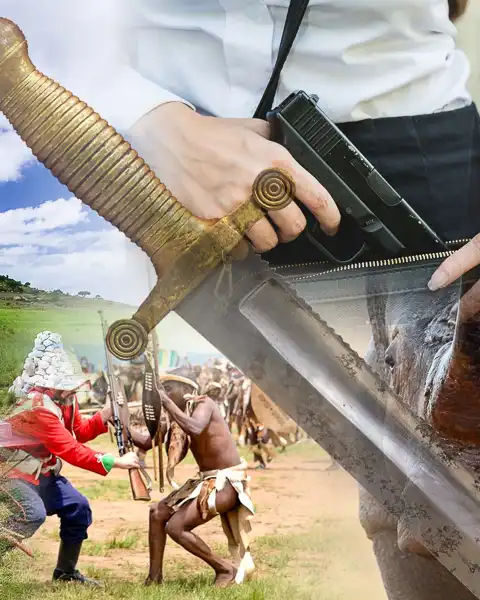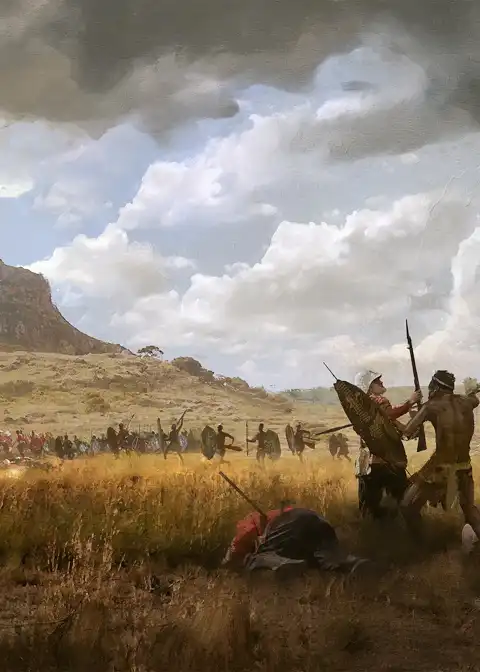

Three bodies are found scattered across South Africa. One on the shores of the Indian Ocean, one in a farm invasion in modern KwaZulu-Natal, and one in 1880, in the aftermath of the Anglo-Zulu War.
Detective Sannie van Rensburg and marine biologist and former soldier Adam Kruger are each on the trail of a mystery, while more than a century ago colonial police officer Peter Gregory has a secret mission: to find the lost sword of the great Emperor Napoleon Bonaparte.
But he’s not the only one who wants it.
From the blood-soaked battlefields of colonial-era Zululand to the modern-day political struggles over land and poaching in South Africa and war in the Middle East, these investigations are on a dangerous collision course.
Because people will kill for a symbol of power.
A heart-stopping chase across South Africa to find Napoleon’s priceless lost sword, by Australia’s master of adventure.
Ever since I first saw the movie ‘Zulu’ (which was released in 1964, the year I was born!) I’ve been fascinated by the Anglo-Zulu War.
Sure, Michael Caine and Stanley Baker’s portrayals of Lieutenants Bromhead and Chard might not have been 100 per cent accurate, but the defence of Rorke’s Drift was a cracking good yarn. Of course, ‘Zulu’ barely touches on the Zulu victory at Isandlwana, which occurred a few hours earlier and was the subject of another film, ‘Zulu Dawn’.
Writing thrillers set in Africa, as I do, I’d long been trying to think of a way to incorporate this fascinating period of history into one of my novels. I was thinking that I would write another Sannie van Rensburg/Adam Kruger book, set in KwaZulu-Natal, and dealing with the problems faced by private game reserve owners who have to protect their rhinos from poachers, but also have a dual timeline, like I did in ‘Ghosts of the Past’.

While trying to think of a different take on the Anglo-Zulu War I remembered reading, as a kid, how a French nobleman, Napoléon Eugène Louis Jean Joseph Bonaparte, aka the Prince Imperial Louis Napoleon, was killed during the later stages of the war. I couldn’t remember exactly how and why this happened, so I started doing some research.
I read an excellent book, With His Face to the Foe, by the respected Anglo-Zulu War historian Ian Knight, which was all about the life, times, and death of the Prince Imperial. Long story short – Louis was the Emperor Napoleon Bonaparte’s great nephew and he was a bit of a ‘Rambo’. Exiled from France he ended up at a British military college, and wangled himself a trip to South Africa at the time of the campaign against the Zulu King, Cetshwayo.
Louis was supposedly in Zululand as an observer with Lord Chelmsford’s army, which was off on a campaign to get some payback for Chelmsford’s embarrassing defeat at Isandlwana. Overzealous to a fault, Louis and his escort ran into trouble, and the Prince was killed in action.
While doing a bit of Googling, I discovered something of an historical anomaly. Several accounts from the time mentioned that Louis had gone into battle armed with one of his great uncle’s swords, a fancy blade that Napoleon Bonaparte had carried at the battle of Austerlitz. I found an historical website which had a discussion thread about the sword, which was taken by the Zulus who killed Louis, but later returned to the British.
It turned out the sword was a plain old French army sword, and not one of Napoleon Bonaparte’s weapons. This struck me as a bit strange; why were there so many historical accounts to the contrary?
Authors like the words ‘what if’. What if, Louis really had been carrying Napoleon’s real sword – which in today’s money would be worth more than $6 million – and after his death someone switched the priceless heirloom for an ordinary sword.
And that is where books come from….

tonyparknews@gmail.com